Index relies entirely on the support of donors and readers to do its work.
Help us keep amplifying censored voices today.
[vc_row][vc_column][vc_column_text]By Ciaran Willis, Lauren Brown and Samantha Chambers
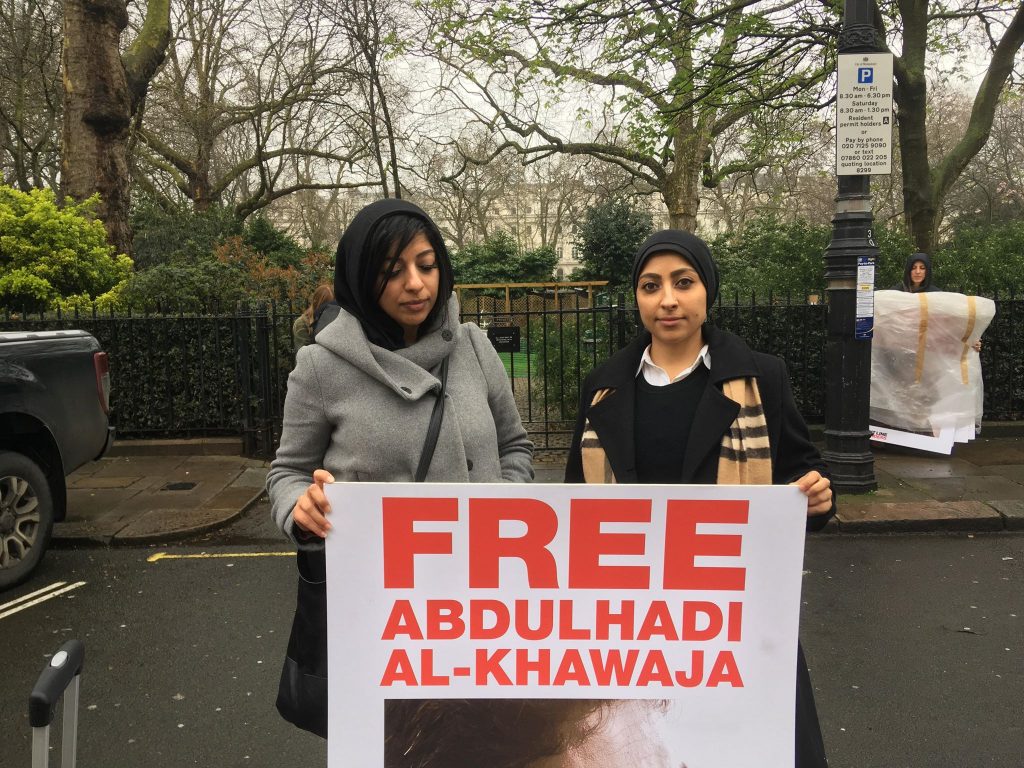
Zainab and Maryam al-Khawaja
The daughters of Abdulhadi al-Khawaja, the co-founder of Bahrain Centre for Human Rights, participated in a demonstration on Monday 9 April outside the Bahrain Embassy in London calling for his release on the seventh anniversary of his arrest.
Maryam and Zainab al-Khawaja joined NGOs and fellow supporters, as they chanted “free free Abdulhadi” and held placards with a picture of the Bahraini human rights activist.
It marked seven years since Abdulhadi al-Khawaja, founder of the 2012 Index on Censorship Freedom of Expression Award-winning Bahrain Centre for Human Rights, was imprisoned for his involvement in peaceful pro-democracy protests that swept the country during the Arab Spring. On 9 April 2011 twenty masked men broke into his house, dragged him down the stairs and arrested him in front of his family.
Bahrain has a poor track record on human rights, with many reports of torture and human rights defenders in jail. Al- Khawaja was part of the Bahrain 13, a group of journalists and activists who faced unfair trials following the unrest.
During his time in prison, Al-Khawaja has been tortured, sexually abused and admitted to hospital requiring surgery on a broken jaw.
His daughter Maryam al-Khawaja was imprisoned in Bahrain for a year before leaving the country in 2014. She faces prosecution on charges including insulting the king and defamation. She told Index: “For me, this isn’t just about my dad, it’s a reminder that we have thousands of prisoners in Bahrain, and we need to remember all of them, and we need to be fighting on behalf of all of them. These are all prisoners of conscience.”
A number of prominent Bahraini campaigners took part in the demonstration.
Jawad Fairooz, a former Bahrain MP and president of SALAM for Democracy and Human Rights, said: “We’re here to support Abdulhadi as a symbol of the demand of the people of Bahrain who want to live in the country with dignity and freedom.”
Sayed Ahmed Alwadaei, director of advocacy at the Bahrain Institute for Rights and Democracy and an activist who fled the country following torture, said: “I’m proud to belong to a nation that Abdulhadi is a part of. Abdulhadi to me is one of the most inspirational individuals.”
Cat Lucas, programme manager at English Pen’s Writers at Risk initiative, said that the government could be doing a lot more to challenge what is going on in Bahrain. She hopes the Bahraini Embassy will finally act, not just in the case of al-Khawaja, “but in the case of lots of writers and activists who are imprisoned for their peaceful human rights activities”.
Protesters have gathered outside the Embassy once a month since January 2018 to highlight the dire human rights situation and ask the UK government to take action.
Al- Khawaja’s daughter Zainab called on the UK to hold the Bahraini regime accountable: “Major governments are still supporting the Bahraini regime with weapons and political training. They’re the people behind them. I can feel as angry here as I would protesting in Bahrain, because I know what the government here is responsible for. I know one of the reasons people are being killed and tortured in Bahrain, including my father, is the support from the British and American governments.”
A group of NGOs, including Index on Censorship and Pen International, signed a letter last week calling on Bahrain to cease its abuse of fundamental human rights.They asked the authorities to immediately and unconditionally free Abdulhadi, provide proper access to medical care and allow international NGOs and journalists access to Bahrain.[/vc_column_text][vc_video link=”https://www.youtube.com/watch?v=8lkS7Fsyqso”][/vc_column][/vc_row][vc_row][vc_column][vc_basic_grid post_type=”post” max_items=”12″ style=”load-more” items_per_page=”4″ element_width=”6″ grid_id=”vc_gid:1523361455279-ef10ef07-647f-1″ taxonomies=”716″][/vc_column][/vc_row]
[vc_row][vc_column][vc_column_text]
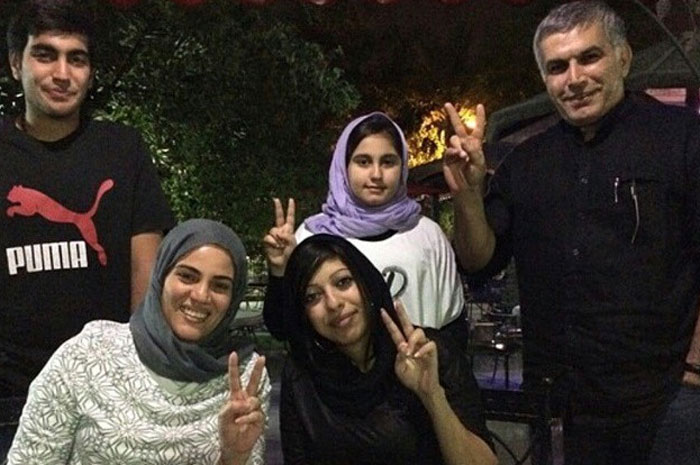
Back Row from left: Adam Rajab, Malak Rajab and Nabeel Rajab. Front Row from left: Sumaya Rajab and Zainab Alkhawaja. (Photo: Adam Rajab)
Human rights defenders often confront obstacles that make their work difficult. This is especially true in Bahrain, where the Sunni monarchy and government have been bent on silencing all opposition ever since the Arab Spring when tens of thousands of Bahraini citizens protested for democratic reform.
In recent months, the nation’s only independent news outlet, Al Wasat, was shuttered and prominent human rights activist Nabeel Rajab was sentenced to two years in prison for “spreading fake news”.
The families of activists suffer along with their loved ones and are often targeted with official harassment: detention, loss of employment, beatings and harassment. Each case is an individual story of a struggle for freedom.
A result of actions
Members of Sayed Ahmed Alwadaei’s family have been harassed and detained due to his ongoing campaigning for democracy and human rights in Bahrain. Most recently his mother-in-law and brother-in-law were detained while Alwadaei attended the United Nations Human Rights Council in March.
Alwadaei, director of advocacy at the Bahrain Institute for Rights and Democracy, is no stranger to detention: he was arrested twice in 2011 and served a six-month sentence in a Bahraini jail. He found asylum in the UK in July 2012. In February 2015, Alwadaei was among 72 Bahraini citizens to be stripped of their citizenship.
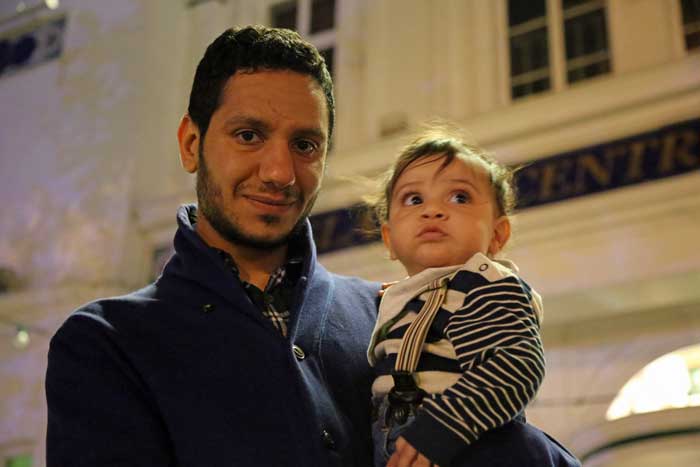
Sayed Ahmed Alwadaei with his son Yousif (Photo: Moosa Satrawi)
In October 2016, Alwadaei’s wife and infant son Yousif also faced official harassment as they tried to leave Bahrain to join Alwadaei in the UK. His wife was arrested at the airport and held overnight, during which time she was ill-treated. It was not until a few months later that she and her son were able to leave the country.
Other members Alwadaei’s family, including his sister, have also faced interrogations.
When asked how he continues campaigning under these circumstances, Alwadaei told index: “We can only get through this by sticking together and staying strong. It’s important to have a supportive family. The potential for arrest and torture is something they know and have to be willing to sacrifice.”
He added that he is balancing his efforts to get his mother-in-law out of prison while continuing his work in activism. “It’s hard but this is the right thing to do.”
“The oppression or torture aims to do one thing: to break your will because you’re not ready for the consequences,” Alwadaei said. “This is the state they want to leave you in. They want you to be broken and this is why we keep going.”
A life-long struggle
Maryam Al-Khawaja has been preparing for and participating in the struggle for human rights her entire life.
As a young child growing up in Denmark, she and her three sisters attended an English-speaking school, but the Al-Khawaja family knew they were only in the country temporarily. Her mother and father had been exiled for speaking out in Bahrain.
At a very young age, she remembers her parents asking her and her siblings before bed: “What have you done today to make the world a better place?” She told Index that her father wouldn’t help them answer the question because he wanted them to think about how the world could be. She remembers dinner conversations alive with politics and philosophical discussion about whether having false hope or no hope was better.
Around the 7th or 8th grade, Al-Khawaja knew wanted to be like her father when she grew up; she wanted to be an activist.
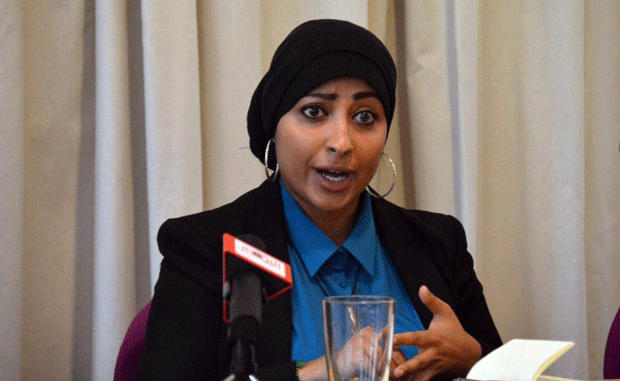
Maryam Al-Khawaja (Photo: David Coscia for Index on Censorship)
Al-Khawaja was 14 when her family returned to Bahrain in 2001. She recalls thinking her family was ready to take on the challenges and that the people of Bahrain would be ready to fight with them. But that was not the case. The country was tired of conflict and believed that the king’s promised reforms would be implemented. At the same time, activists were not popular among ordinary Bahrainis.
At college she said she was criticised by her classmates for speaking her mind about the state of their country, which caused her to lose interest in her father’s reform work. At the time, she asked him: “Why are you trying to change a situation for people who don’t want to change it for themselves?” His response was simple: “Someday you will understand.”
It wasn’t until 2011 during the Arab Spring protests that she developed a newfound respect for her father and was ashamed of herself for ever doubting him. She admits growing up in Denmark made her think fighting for human rights would be easy. When her father, along with 12 other leaders of the uprising, was arrested and sentenced to life imprisonment, she found that a life of campaigning isn’t so effortless.
During our conversation, Al-Khawaja jumped off the phone for a few minutes to take a call from her father. She had not heard from him in over three weeks and said their phone calls are always random and typically short as it is normal for the line to be cut if anything about the Bahrain government or any activist’s work is mentioned.
Until recently, her mother and sisters in Bahrain had not seen her father since February as their requests to visit have continually been denied. Al-Khawaja has not seen her father since 2014 as there are multiple fabricated charges against her that would mean imprisonment if she returned to the country.
Since her father’s imprisonment, Al-Khawaja and her older sister Zainab have been active in the push for human rights and freedom of speech in Bahrain. She says her father has two main characteristics as an activist: a fierce advocate and a fiery speaker. She explained that she and Zainab are the two parts to that whole: Al-Khawaja as the advocate and Zainab as the speaker.
Al-Khawaja said the work of her father and her sister Zainab has been tough for her two younger sisters. One sister had the highest scores in nursing school in Bahrain and graduation seemed to promise a job. But the paperwork from the government granting her access to work never came. She’s been waiting nearly eight years without a job. Al-Khawaja said it’s difficult for her family members when they’re in jail as they have to “take care of us when we cannot take care of ourselves”.
Her mother also felt the effects of the family member’s work when she was fired from her private school teaching job where she was the head of guidance.
A cause for celebrity status never wanted
Adam Rajab realised when he was young that his father Nabeel wasn’t like other dads. “I was so confused ‘why does my father work all day, while other fathers have certain working hours?,’” he told Index.
During a holiday he asked his father to take a break for a day. His father answered: “My colleagues are in prison. I can’t stop my work because they are suffering behind bars.”
In 2006, when Rajab was nine years old, he vividly recalls seeing his father come home bleeding from his head with a swollen and bruised back. “I was shocked and terrified but my father continued protesting like nothing had happened,” he said. “This was terrifying to me but the determination and fearlessness I saw in him really inspired me.”
In 2011 Nabeel Rajab’s work became well known. He appeared on TV and was the first activist to use social media to support the revolution then sweeping Bahrain. “Wherever we went, people would stop him and start taking pictures,” Adam said, adding that the strange situation was a shock to the family. “It started to become difficult because we couldn’t enjoy a private life like we used to.”
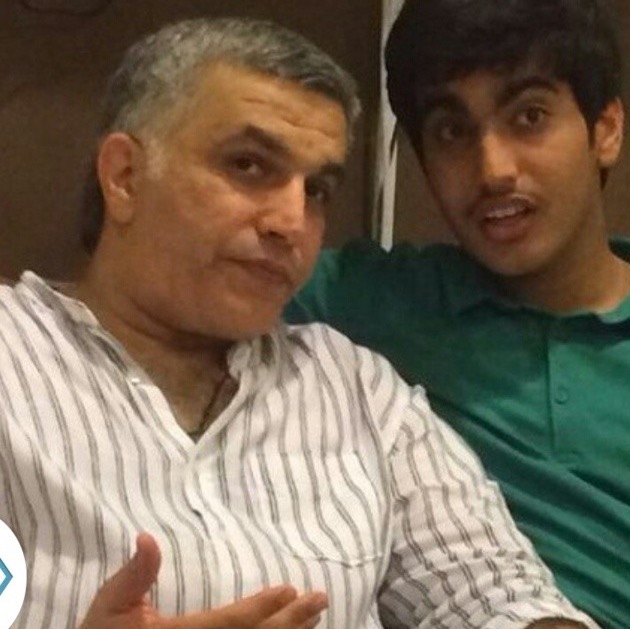
Nabeel Rajab with his son Adam Rajab
As a leader of the movement, Rajab’s father has become a face leaders around the world recognise but do little about. For years he has been in and out of jail. On 10 July 2017 he was sentenced to two years in prison for “broadcasting fake news”.
Although no one in the family has been arrested, his mother was harassed at her government job and then fired. Rajab and his sister have also faced harassment in school.
Rajab and his father have a very close relationship so the imprisonment has not been easy. “I haven’t seen him for more than a year now and he faces more charges which probably means more prison sentences,” Rajab said. “I find it difficult to enjoy anything while he is locked up in a cell and deprived of life, but as he taught me, the spirit is always up.”
Rajab wants his father to free and for them to live like any other ordinary family, but this does not take away from how proud he is or the strength of his belief in his father’s cause.
An open ended sentence
It’s difficult to imagine the emotions these activists and their families go through on a daily basis. A psychologist from the Refer Self Counselling Psychology Practice explained to Index that having a family member with a sentence with a sure release date is one case but when trials or release dates are postponed time and time again as they are in Bahrain, it is much more difficult. “We are rational problem solvers but not good with the unpredictable.”
The psychologist explained the situation in Bahrain is unlike what most with family members behind bars will ever experience. False hope puts an even greater emotional strain on loved ones.[/vc_column_text][/vc_column][/vc_row][vc_row][vc_column][vc_row_inner][vc_column_inner][vc_basic_grid post_type=”post” max_items=”4″ element_width=”6″ grid_id=”vc_gid:1503052292764-bb1a6c59-5e91-2″][/vc_column_inner][/vc_row_inner][/vc_column][/vc_row]
As the 32nd Session of United Nations Human Rights Council (UNHRC) opened in Geneva on 13 June, Nabeel Rajab, Bahrain’s most high profile human rights defender, was arrested after dozens of police officers raided his home at around 5am and confiscated his electronic devices. The day before, Bahraini human rights defenders and victims of violations were prevented from flying to Geneva.
Rajab, President of the Bahrain Center for Human Rights (BCHR), Founding Director of the Gulf Centre for Human Rights (GCHR) and Deputy Secretary General of FIDH, was reportedly arrested under order from the Ministry of Interior’s Cybercrimes Unit. Bahraini officials had imposed a travel ban on Rajab a year ago, and since April 2015 have maintained charges against him for crimes related to freedom of expression online. Despite the submission of several appeals against the ban, authorities remained unresponsive. On 14 June 2016, Rajab was transferred to the public prosecution; and new charges were brought against him of allegedly “publishing and broadcasting false news that undermines the prestige of the state.” The public prosecution remanded him to seven days in detention pending investigation.
In a new and concerning escalation of its crackdown against civil society, Bahraini authorities have also banned human rights defenders from leaving the country. The bans were imposed as the activists were attempting to travel from the Bahrain International Airport to Geneva to participate in the 32nd Session of UNHRC. The undersigned organisations are seriously alarmed by Bahrain’s restrictions civil society especially the restrictions preventing them from engaging with the UN.
On 12 June 2016, the Nationality, Passport, and Residence Department officials at Bahrain International Airport prevented at least six individuals from boarding their planes to Geneva. Bahraini authorities imposed a travel ban on Hussain Radhi of BCHR, Ebtisam Al-Saegh, Ebrahim Al-Demistani, someone who does not wish to be named, and the parents of Ali Mushaima, a victim of extrajudicial killing in 2011. The father of another victim of extrajudicial killing, Sayed Hashim, was stopped at King Fahd Causeway and told of the ban.
On 12 June, the authorities at the airport held the passports of Radhi and Al-Saegh for 45 minutes before informing them they were banned from traveling. They were referred to the Ministry of the Interior’s Nationality, Passport, and Residence Department to inquire about the reason for the ban. However, after inquiring at the Department, they were told that there are no travel bans imposed on them. Radhi and Al-Saegh then tried to travel through King Fahd Causeway but were again stopped for up to an hour and told that they cannot travel because of the travel ban.
Al-Demistani was also told that a travel ban – of which he had no prior knowledge – was imposed on him. An official at the Nationality, Passport, and Residence Department confirmed to him that there had been a notice on his name imposed by the public prosecution since 9 June 2016.
On 10 June 2016, authorities banned Dr. Taha Al-Derazi, a former political prisoner and activist, from traveling to the United Kingdom with his wife. He too was told to inquire at the Immigration, Passport, and Residency Department for more information but was also given no reason for the ban. Dr. Al-Derazi participated in the previous UNHRC session and it is believed that the ban is to prevent him from participating in the current session.
On 13 June 2016, Jalila Al-Salman, vice president of the dissolved Bahrain Teachers Society, was not allowed to leave Bahrain when she attempted to travel to Oslo. A travel ban has also been in place against human rights activist Maytham Al-Salman following his participation in various international human rights related conferences.
Preventing civil society from engaging with the UN is a relatively new tool being used in Bahrain to intimidate and silence freedom of expression. A pattern of reprisals against human rights defenders has emerged to prevent reporting on severe ongoing rights abuses in the country. As a signatory to the International Convention on Civil and Political Rights (ICCPR), Bahrain has committed to uphold international standards of freedom of movement and freedom of expression. Article 12 of the ICCPR states that, “everyone shall be free to leave any country, including his own.” Article 19 states that “everyone shall have the right to freedom of expression.” Both rights can only be restricted in limited circumstances.
On 06 June 2016, human rights defender Zainab Al-Khawaja and her two children, Jude and Abdulhadi, arrived in Denmark, where she is a dual citizen, after she was forced to leave the country. Al-Khawaja reported that after she was released from prison on 31 May 2016, she was threatened that if she did not leave Bahrain immediately, she would face new cases with lengthy sentences that would result in her being separated from both her children.
In light of this escalated attack on civil society in Bahrain, we call for the immediate release of all human rights defenders in Bahrain including Nabeel Rajab, and for the removal of the imposed travel bans which unfairly restrict activists’ freedom of movement. We also request that the President of the UNHRC, the UN High Commissioner for Human Rights, the Special Rapporteur on the Situation of Human Rights Defenders, the Special Rapporteur on Freedom of Opinion and Expression and the Special Rapporteur on the Rights to Freedom of Peaceful Assembly call on the Bahraini authorities to immediately and unconditionally lift the travel ban imposed on Bahrain’s civil society activists and guarantee Bahraini human rights defenders are free from intimidation and restrictions on their work, including at the UN. We also call on the international community to hold the government of Bahrain to its commitments and obligations to foster a safe environment for the peaceful enjoyment of universal human rights.
The government of Bahrain must immediately stop the ongoing reprisals against human rights defenders who are engaging with international mechanisms including the UN system.
Signed:
Americans for Democracy & Human Rights in Bahrain (ADHRB)
Arabic Network for Human Rights Information (ANHRI)
Bahrain Center for Human Rights (BCHR)
Bahrain Institute for Rights & Democracy (BIRD)
Cairo Institute for Human Rights Studies
CIVICUS: World Alliance for Citizen Participation
English PEN
European Centre for Democracy & Human Rights (ECDHR)
FIDH, within the framework of the Observatory for the Protection of Human Rights Defenders
Front Line Defenders
Gulf Centre for Human Rights (GCHR)
IFEX
Index on Censorship
International Service for Human Rights (ISHR)
Justice Human Rights Organization (JHRO)
Lawyer’s Rights Watch Canada (LWRC)
PEN International
Rafto Foundation for Human Rights
Reporters Without Borders (RSF)
Vivarta
World Organisation Against Torture (OMCT), within the framework of the Observatory for the Protection
Index on Censorship condemns the arrest on Monday 13 June of human rights campaigner Nabeel Rajab in Bahrain. According to reports Rajab was charged on Tuesday 14 June with “publishing and broadcasting false news that undermines the prestige of the state” and detained for seven days.
Rajab, a former Freedom of Expression Award winner and a judge on this year’s awards, is one of the Gulf region’s most well-known human rights activists. Since the Bahraini uprising of 2011, he has been arrested on numerous occasions: he spent two years in jail between 2012 and 2014, and was arrested just months after his 2014 release for tweets in which he called Bahraini institutions “ideological incubators” for ISIS.
Rajab, president of the award-winning Bahrain Center for Human Rights (BCHR), and a member of the advisory committee of the Human Rights Watch Middle East division, spent three months in jail for the tweets. He was rearrested on Monday, according to the Bahrain Institute for Rights and Democracy. The reasons for the arrest were unclear.
“The harassment of Nabeel Rajab must stop. We call on the international community – and especially Bahrain’s close ally, the United Kingdom – to condemn this ongoing attempt to silence one of the region’s most highly respected human rights campaigners,” said Index chief executive Jodie Ginsberg.
Bahraini authorities have repeatedly targeted Rajab as well as other human rights campaigners and political activists. Last week, Zainab Al-Khawaja was forced into exile in Denmark. Abdulhadi Al-Khawaja, her father, is serving a life sentence for his calls for democracy in Bahraini society. Her sister, Maryam Al-Khawaja, has also been harassed by the authorities and has been exiled to Denmark.
Related: Bahrain continues to use arbitrary detention as a weapon to silence critics